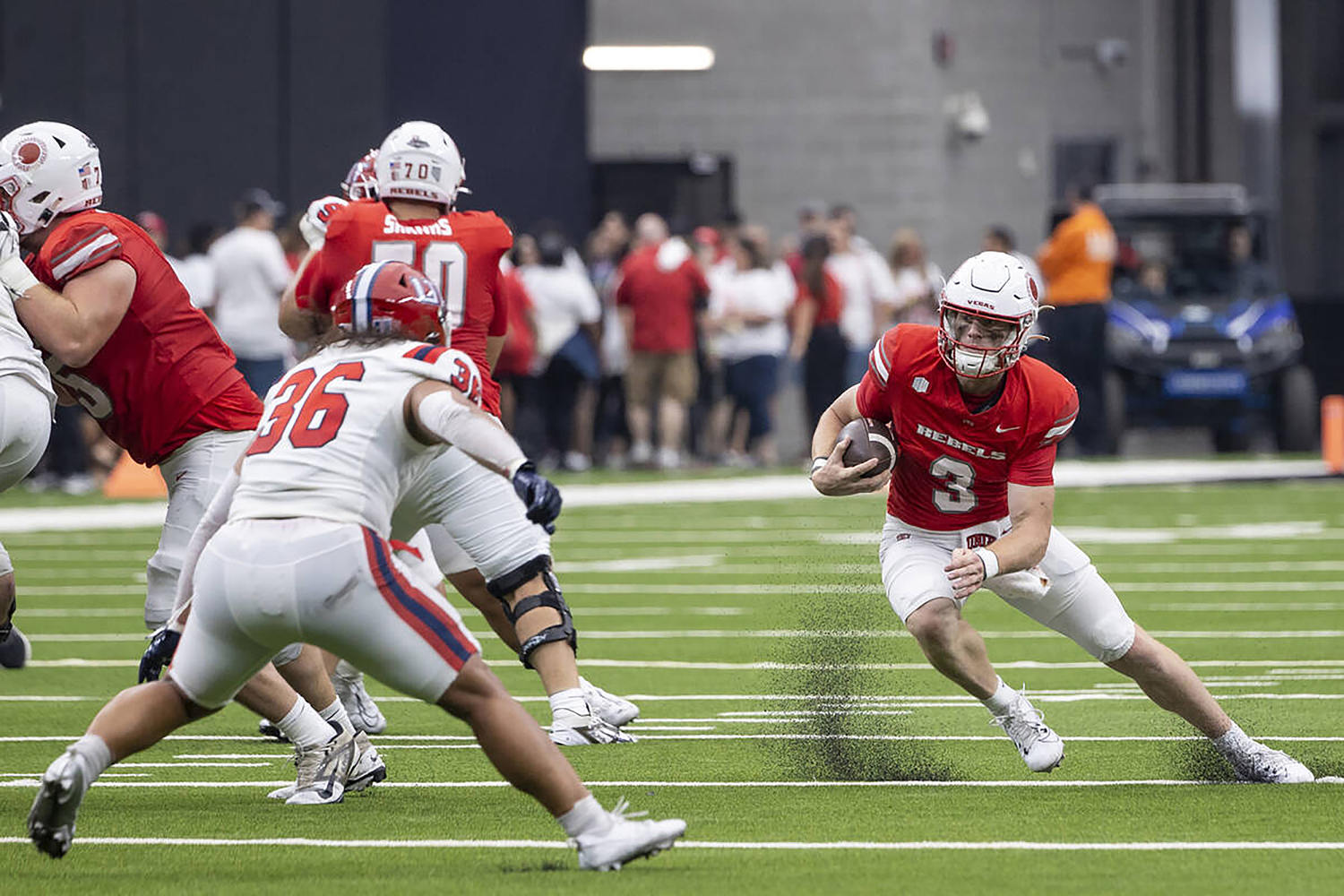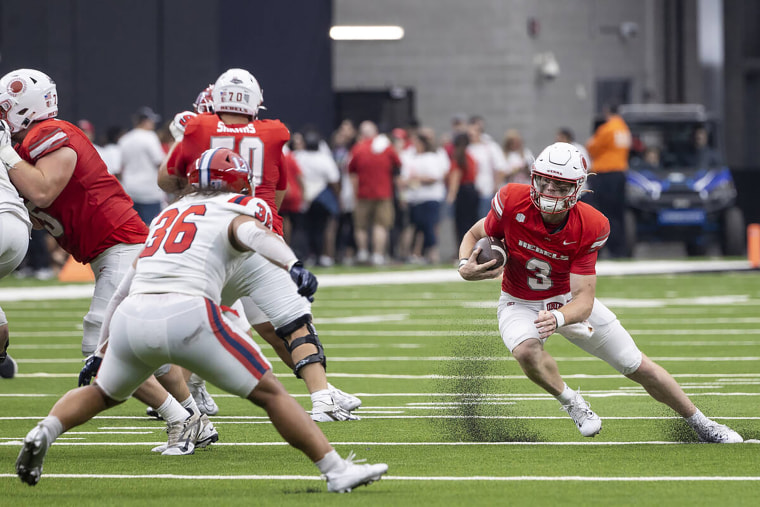Politics
This undefeated QB’s mid-season decision was a surprise. His reason was a warning.

In 2021, the Supreme Court ruled that the NCAA could not prohibit student-athletes from profiting from education-related payments. Better known as the name, image, and likeness (NIL) ruling, the high court said that student-athletes could get paid for use of their name, image and likeness without endangering their “amateur” status. What has followed in the wake of that decision can only be described as utter chaos.
Two major NIL-related college football stories over the past few days are case in point.
The high court said that student-athletes could get paid for use of their name, image and likeness without endangering their “amateur” status.
On Tuesday night, UNLV starting quarterback Matthew Sluka announced he was leaving the Rebels’ 3-0 football program. Sluka had transferred to the school from Holy Cross after last season. His agent told ESPN that Sluka’s decision was motivated, at least in part, by a verbal offer of $100,000 promised by an assistant coach. Sluka’s father claims UNLV head coach Barry Odom claimed the verbal offer wasn’t valid since it didn’t come from him.
UNLV has a different perspective. The university said in a statement that the student-athlete’s “representative made financial demands upon the University and its NIL collective in order to continue playing.” The school claimed that while it has “honored all previously agreed-upon scholarships for Matthew Sluka,” the demands made by Sluka’s team were interpreted “as a violation of the NCAA pay-for-play rules, as well as Nevada state law.”
There’s more: UNLV has a fan- and alumni-driven collective that helps to pay players for their name, image and likeness. The Friends of UNLV collective says it has no record of Sluka being owed any money outside of a $3,000 payment made to him over the summer for an engagement he took part in.

Sluka’s departure so early in the season means he maintains another year of eligibility if he transfers to another program. But it also means he’s abandoned his teammates after one of the best starts in school history, with wins over Big 12 foes Houston and Kansas.
Either way, this “new normal” for college athletics feels increasingly like the Wild West. As loudmouth conservative sports-and-news commentator Clay Travis accurately pointed out, not even pro sports has “perpetual free agency” that allows you to walk out on a team four games into a season and join another.
In another corner of the internet, controversial Barstool Sports founder and CEO Dave Portnoy took to social media on Thursday to offer up to $3 million dollars yearly to top (and eligible) quarterbacks who commit to his alma mater, Michigan. Four years ago, if a coach bought too many cheeseburgers for a starving player on his roster, the NCAA could sanction him. Now, you have sports media company owners offering suitcases of cash to student-athletes.
All a college player has to do these days is endorse a product or appear in a car ad somewhere, and a “friend of the program” can pay him whatever they want. Portnoy suggested he’d pay the players via a “$3 million marketing agreement.” “I think that’s legal,” he told listeners. And he’s probably right. The NCAA has disclosure agreements put in place, but the organization isn’t doing nearly enough to keep teams from essentially putting together the best squads that money can buy.
Now the NCAA is proposing a $17 million to $22 million salary capsimilar to the way pro sports teams operate. This salary cap would cover all athletic programs under each school’s umbrella, not just football. Many big questions remain unanswered. How would this money be distributed at schools with multiple high-profile sports programs? For instance, a school with a powerhouse women’s volleyball program could also have a top 20 football team. How do you decide how much money goes where? And would this create absurd and unfortunate rivalries between athletes at the same school? This sure seems like where collegiate athletics is heading.
For years, advocates screamed bloody murder about how schools were taking advantage of student-athletes by raking in tens of millions of dollars off their achievements. Now, many of those same advocates seem content to watch the entire collegiate sports system start to implode, while the system tries to play catch-up amidst a new and very complicated world order.
Jason Page is the host of the nationally syndicated daily TV show “SportsWrap w/Jason Page.”
Politics
Republicans move forward with controversial megabill accounting move
Senate Republicans are on the cusp of formally adopting a controversial accounting tactic to zero out much of the cost of their massive domestic policy bill. The matter came to a head on the Senate floor Sunday afternoon, when Democrats sought to prevent the use of the current policy baseline…
Read More
Politics
Megabill reading wraps up after nearly 16 hours
Senate clerks have completed a nearly 16-hour reading of the GOP’s 940-page megabill. Clerks began reading the text aloud at 11:08 p.m. Saturday and finished Sunday at 3:03 p.m. By refusing to waive chamber rules allowing for reading, Senate Democrats hoped to create an opportunity to highlight some of the most unpopular issues in the legislation…
Read More
Politics
White House eyes Kentucky state senator for Massie challenge
White House officials will host Kentucky state Sen. Aaron Reed in the coming weeks for a discussion about challenging GOP Rep. Thomas Massie in next year’s Republican primary, according to two people granted anonymity to describe the private plans. President Donald Trump and his political operation have been searching for a candidate to challenge Massie over his opposition to the president’s “big…
Read More
-

 The Josh Fourrier Show8 months ago
The Josh Fourrier Show8 months agoDOOMSDAY: Trump won, now what?
-
Uncategorized8 months ago
Bob Good to step down as Freedom Caucus chair this week
-

 Politics8 months ago
Politics8 months agoWhat 7 political experts will be watching at Tuesday’s debate
-

 Politics8 months ago
Politics8 months agoHow Republicans could foil Harris’ Supreme Court plans if she’s elected
-
Economy8 months ago
Fed moves to protect weakening job market with bold rate cut
-
Economy8 months ago
It’s still the economy: What TV ads tell us about each campaign’s closing message
-

 Politics8 months ago
Politics8 months agoRFK Jr.’s bid to take himself off swing state ballots may scramble mail-in voting
-
Uncategorized8 months ago
Johnson plans to bring House GOP short-term spending measure to House floor Wednesday


